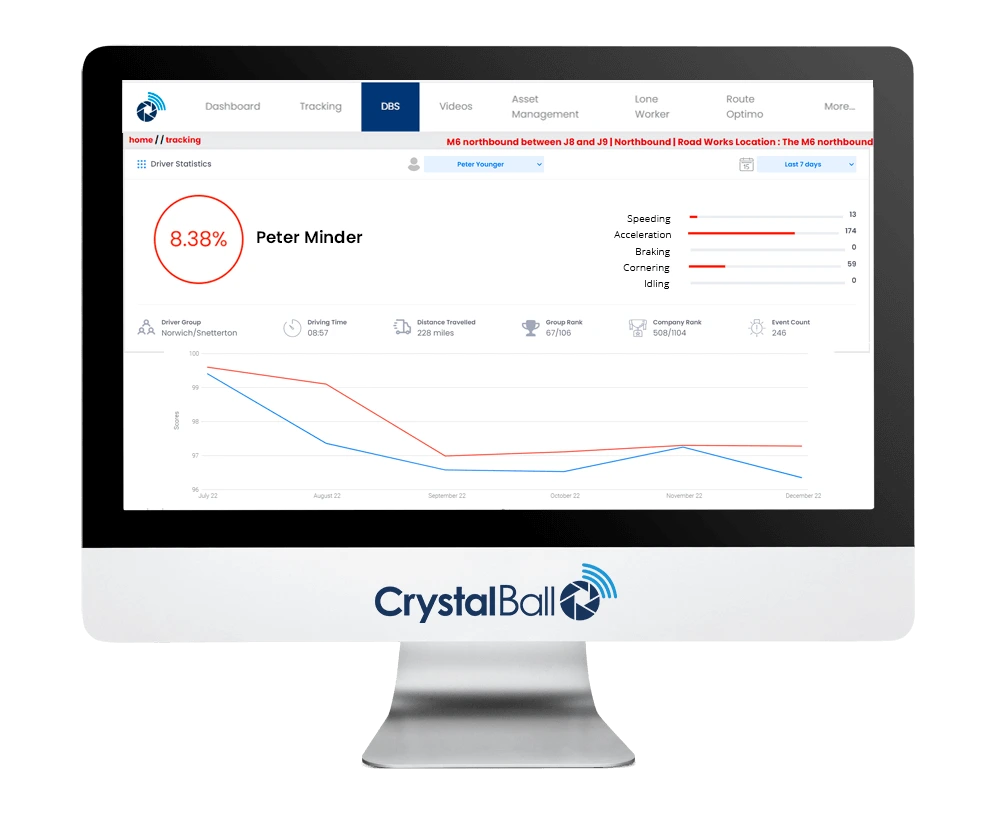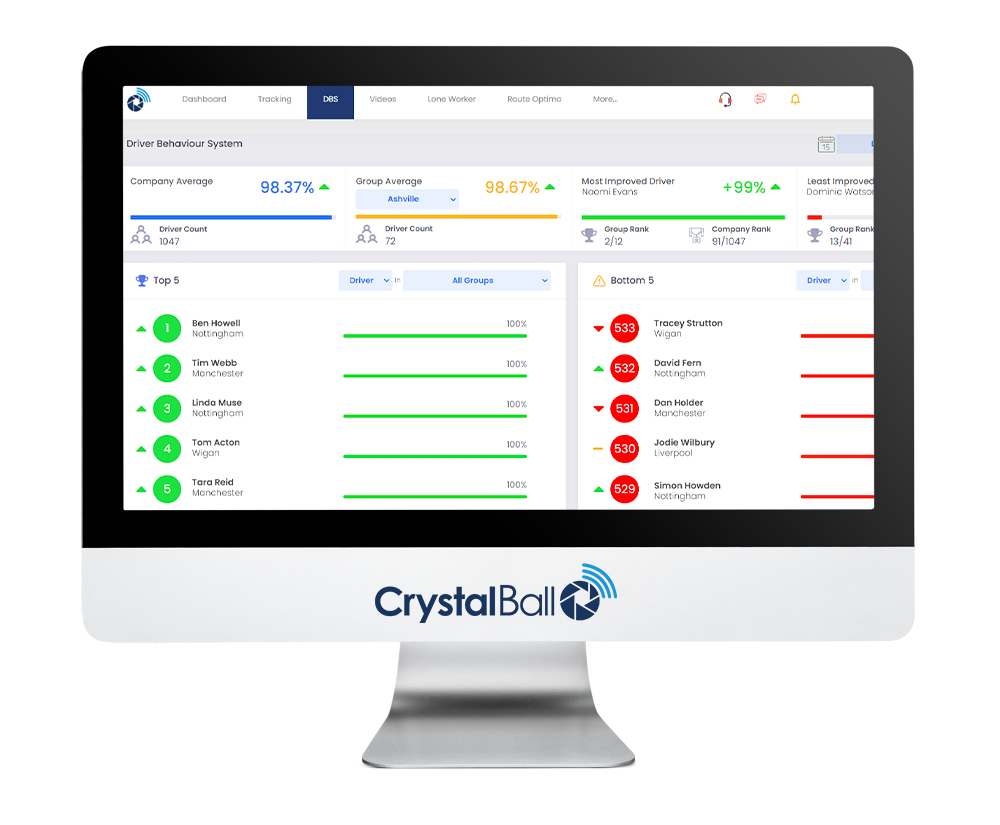With more than 67% of accidents in the UK caused by driver error, this is the leading cause of road collisions. These errors include drivers failing to look correctly, bad behaviour or inexperience, and poor judgement. Improving driver behaviour plays a significant role in enhancing fleet safety and operations, but creating a driver training program can be challenging for fleet operators who do not have the means to monitor their drivers’ behaviour on the road. This is where behavioural data supplied by AI dash cams can make a noticeable difference.
In this article, we look at how you can use behavioural data to customise driver safety training programs. Learn about the types of data collected, how to analyse it, how to develop targeted training initiatives based on specific behaviours and trends, and the benefits of personalised training for improving performance and safety.
AI Dash Cams Monitor Driver Behaviour
Before you can create driver behaviour training programs that are effective and relevant, you need to understand what your drivers are doing on the road. While you can’t be present in every vehicle at the same time, you can use AI dash cams as your eyes and ears.
Crystal Ball’s 4G dash cams use facial recognition technology and AI to monitor driver behaviour behind the wheel. Whenever these cameras detect the following behaviours, they alert the driver audibly in the cab and send a video to the fleet managers:
- – Mobile phone use
- – Smoking while driving
- – Eyes looking to the right or left for too long
- – Eyes closing for a long time
- – Falling asleep
- – Yawning
- – Head lowered (sleeping)
- – The driver’s absence from the wheel when the vehicle is moving
A future development will also see our cameras be able to detect seatbelt use. Thanks to the audible alerts they send, our cameras act as onboard driver behaviour and training coaches, encouraging drivers to improve their behaviour. Our vehicle tracking system also monitors driver behaviour based on several key performance indicators (KPIs), including harsh acceleration, braking, speeding, and cornering, as well as excessive idling. These factors not only can lead to accidents they also can push up fuel and maintenance costs. The system scores drivers based on their performance.
You can use the valuable data provided by these technologies to distinguish between your top performers and those who require driver training in the UK. You can also analyse the data to create tailored driver behaviour training programs.
Analysing Driver Behaviour Data
The data collected by AI dash cams is a goldmine of insights into what your drivers do while on the road. Some of your drivers might lapse from good driving behaviour occasionally, while others might exhibit bad driving behaviours consistently. By analysing the data, you can recognise patterns of aggressive, risky, or costly behaviours and pinpoint focus areas for driver safety training.
Our systems make it easy to collate and analyse driver behaviour data. In addition to accessing the driver league table featuring scores, you can generate detailed behaviour reports.
For example, if you receive enough alerts to notice that harsh accelerating or speeding is an ongoing trend with one or more of your drivers, you can generate a detailed acceleration or speeding report detailing the locations, distance, and duration of these incidents. You also might notice that some drivers are distracted, almost fall asleep, or smoke or use their mobile phones regularly while driving. Our software allows you to generate reports on these behaviours, offering a fuller picture of driver behaviour.
This enables you to give personalised feedback to each driver and to ask them for feedback. For example, you can ask specific drivers why they keep repeating certain behaviours, which can help you identify core issues that need to be addressed.
This data also enables you to provide constructive criticism and driving tips, and you can customise driver behaviour training programs based on individual drivers’ performance.
For example, if one of your drivers speeds regularly, you can focus training on defensive driving, discuss alternative routes, and establish speed limits in keeping with safety regulations. If another driver regularly brakes harshly, you can focus their training on defensive driving and maintaining safe following distances. If you pick up that one of your drivers regularly starts falling asleep at the wheel and realise through dialoguing with them that their ongoing fatigue is a result of lack of sleep and an unhealthy diet, you can customise their driver training to include the importance of taking regular breaks as well as tips for nutritious, energy-boosting meals and snacks.
When the customised driver training is complete, you can use our dash cams and vehicle tracking systems to monitor their progress, offer positive reinforcement, and provide incentives and rewards to drivers who show improvement.
The Benefits of Personalised Driver Training
Improving your drivers’ behaviour through customised driver training can lead to numerous benefits for your organisation. Some of these benefits include:
Safer, more skilled drivers: The right driver behaviour training can help reduce the number of accidents and related deaths on the UK’s roads.
Less downtime and lost business: Better driving behaviours should lead to fewer of your fleet’s vehicles spending time off the road as a result of accidents and collisions, which means your business suffers fewer losses.
Reduced fuel and maintenance costs: Encouraging better driving behaviours among your drivers can lead to reduced fuel costs due to less harsh acceleration, speeding, and idling. It can also lead to reduced maintenance costs due to less wear and tear and fewer accidents.
Greater compliance: Driver safety training is one way in which you can manage the risks to your drivers as part of your organisation’s compliance with the Management of Health and Safety at Work Regulations 1999.
Enhanced employee satisfaction: Constructive, positive driver behaviour training demonstrates that you care for their safety and are serious about nurturing their skills. This can make your drivers feel valued at work, leading to enhanced employee satisfaction and employee retention.
Improve Driver Behaviour and Training
AI dash cams can make all the difference when it comes to improving driver behaviour and training by providing valuable, data-driven insights. Contact Crystal Ball for dash cams that monitor the behaviour of your fleet’s drivers to make every journey a safer one.


